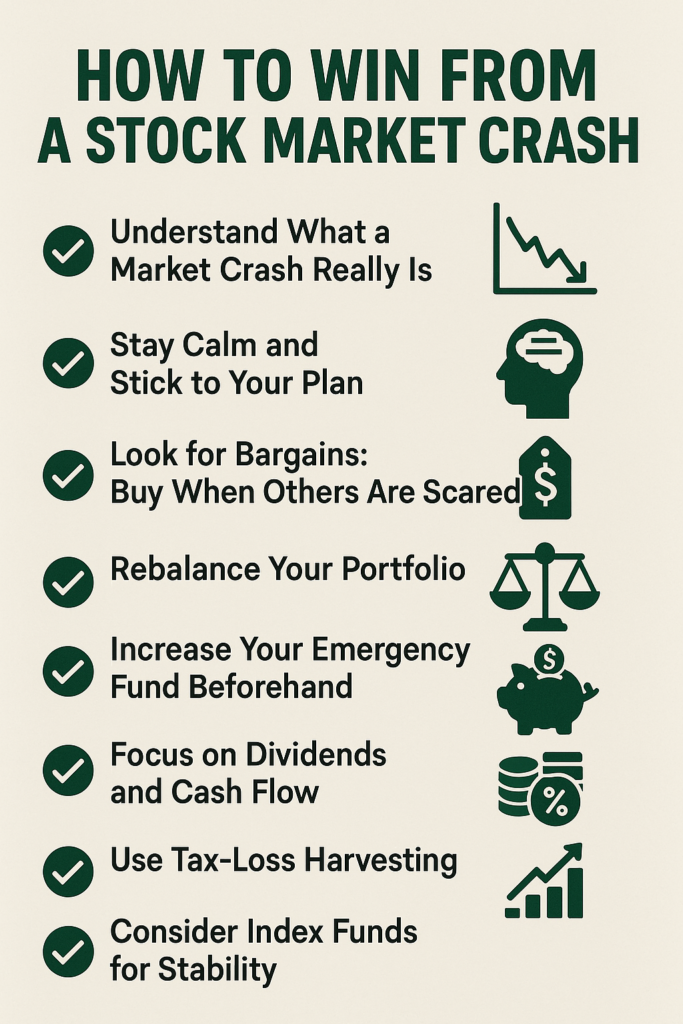A stock market crash can be terrifying. Headlines scream losses, portfolios shrink, and fear takes over. But here’s the truth most don’t talk about: a market crash isn’t just a threat—it’s also a rare opportunity. If approached wisely, it can be the perfect moment to build wealth and secure your financial future.
In this article, we’ll break down how to win from a stock market crash—not just survive it.

1. Understand What a Market Crash Really Is
A stock market crash typically refers to a sudden and severe drop in stock prices, often triggered by economic events, investor panic, or unexpected global crises (like the 2008 housing crisis or the 2020 pandemic). But crashes are not the end of the world—they’re part of the normal economic cycle.
Historically, the market has always recovered and gone on to reach new highs. Knowing this should help you resist panic and think long term.
2. Stay Calm and Stick to Your Plan
In a crash, emotions run high. But smart investors don’t make decisions based on fear.
- Don’t panic sell: Locking in losses only makes things worse.
- Review your investment goals: Are you investing for long-term growth? Then your timeline likely gives the market plenty of time to recover.
- Keep contributing: If you’re regularly investing, don’t stop now. You’re buying shares at a discount.
3. Look for Bargains: Buy When Others Are Scared
The most successful investors—like Warren Buffett—are known for buying when the market is down. This is where real wealth is built.
- High-quality stocks are on sale: Look for strong companies with solid fundamentals whose prices have dropped due to fear, not performance.
- Use dollar-cost averaging: Invest a fixed amount regularly. This reduces the impact of volatility and ensures you buy more shares when prices are low.
- Focus on sectors that will bounce back: Healthcare, tech, and consumer staples often recover well.
4. Rebalance Your Portfolio
Market crashes throw off your asset allocation. This is a great time to review and rebalance.
- If your stock holdings have dropped, your portfolio may be more conservative than you intended.
- Consider moving money from bonds or cash back into equities to restore your target allocation and take advantage of low prices.
5. Increase Your Emergency Fund Beforehand
The best time to prepare for a crash is before it happens. Having a healthy emergency fund helps you avoid selling investments in a downturn.
- Aim for 3–6 months of expenses in cash or a liquid savings account.
- This gives you confidence and flexibility during uncertain times.
6. Focus on Dividends and Cash Flow
During a crash, income-generating assets are valuable.
- Dividend stocks provide cash flow even when prices fall.
- Look for companies with a history of stable or growing dividends, especially in essential industries.
- Reinvesting dividends during a downturn can boost long-term returns significantly.
7. Use Tax-Loss Harvesting
If some investments are down, you can sell at a loss to offset capital gains from other investments and reduce your tax bill.
- You can also carry forward losses to offset future gains.
- Just be careful of the wash-sale rule—you can’t buy the same investment within 30 days or the loss won’t count.
8. Learn and Reflect
Each crash is a learning experience. Reflect on how you responded emotionally and financially:
- Did you panic sell?
- Did you miss buying opportunities?
- Were you overexposed to risky stocks?
Use the experience to improve your investing strategy for the future.
9. Consider Index Funds for Stability
If picking individual stocks feels risky, index funds (like the S&P 500 ETF) are a solid choice.
- They offer broad diversification, reducing risk.
- Historically, the market has always bounced back—so holding an index fund through a crash can be one of the best long-term strategies.
10. Remember: Crashes Are Temporary, Wealth Is Long-Term
Market crashes don’t last forever, but the actions you take during them can have a permanent impact on your wealth. The key to winning from a crash is being prepared, staying calm, and acting with strategy—not emotion.
Final Thoughts
A stock market crash is like a fire sale for investors who are ready. While others are running for the exits, you can be quietly building the foundation for serious future gains. With the right mindset, a solid plan, and a bit of courage, you won’t just survive the crash—you’ll come out ahead.
